YOUR BOOKS BROKE MY NECK: A Physiosociative Review of Spork’s Chapbook Series # A – 4 (Jake Levine, Dan Beachy-Quick, Gordon Massman, Drew Krewer, Zachary Schomburg)
by Joe Hall and A Poem In A Remaindered Library Book
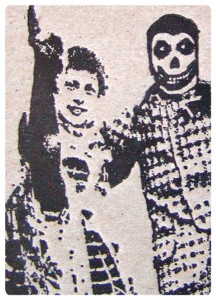 Dear mother…just now I am at the foot of a bone bridge. I shall be crossing it shortly. I don’t know if I shall find hills and valleys made of flesh on the other side, or simply constant night, villages of sleep. The seam of the open book on the bridge of my nose, two dense board covers pressing down the pages over my eyes on a bed in a basement dug into a planet. The spine of the book a roof peak for my face-house. Or a lid. It fits pretty good. I feel safe, take a nap. No, no, dummy, you are not designed to hurt me; I am designed to hurt you…Prominent stencils I remember in DC: some gorilla head, the Borf face (his dead friend?), like targets on specific lamp posts in Georgetown—as if the graffiti artists want you to remember there used to be punk shows there. And on Jake Levine’s (Chap A) cover—the black ink pressed into the brown paper board. Some kind of guy in a flannel suit with a smiling skull mask holding one foot up at head level? As if I’ve seen it through a metro window on some concrete barrier in Northeast?
Dear mother…just now I am at the foot of a bone bridge. I shall be crossing it shortly. I don’t know if I shall find hills and valleys made of flesh on the other side, or simply constant night, villages of sleep. The seam of the open book on the bridge of my nose, two dense board covers pressing down the pages over my eyes on a bed in a basement dug into a planet. The spine of the book a roof peak for my face-house. Or a lid. It fits pretty good. I feel safe, take a nap. No, no, dummy, you are not designed to hurt me; I am designed to hurt you…Prominent stencils I remember in DC: some gorilla head, the Borf face (his dead friend?), like targets on specific lamp posts in Georgetown—as if the graffiti artists want you to remember there used to be punk shows there. And on Jake Levine’s (Chap A) cover—the black ink pressed into the brown paper board. Some kind of guy in a flannel suit with a smiling skull mask holding one foot up at head level? As if I’ve seen it through a metro window on some concrete barrier in Northeast?
*
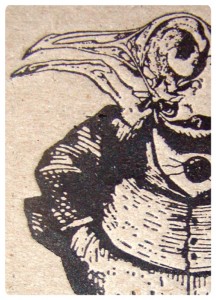 Bird’s skull pointed left, in profile pressed into the cover. Bird skull where head of obese man, his body flaring out like a pear, his hands in his pocket of a three piece suit. I extend my arm to comfort where the dog should be. Feeling the slight, rounded depression under my thumb. Loops of the letters—the name pressed into the cover too. Down into. And the illustrations, its outlines, are also pressed, what’s it—a guy with a moustache in bed, his son standing behind him on the mattress in pinstripes swinging what looks like a sword down toward the piñata of his head while the rest of the family watches? Opaque wrapper with lipstick in lip shapes and eyeliner making the Marilyn face beneath. As the cover is displaced as it will be ripped, discarded, what’s left is a skull with a Marilyn wig and eyes.
Bird’s skull pointed left, in profile pressed into the cover. Bird skull where head of obese man, his body flaring out like a pear, his hands in his pocket of a three piece suit. I extend my arm to comfort where the dog should be. Feeling the slight, rounded depression under my thumb. Loops of the letters—the name pressed into the cover too. Down into. And the illustrations, its outlines, are also pressed, what’s it—a guy with a moustache in bed, his son standing behind him on the mattress in pinstripes swinging what looks like a sword down toward the piñata of his head while the rest of the family watches? Opaque wrapper with lipstick in lip shapes and eyeliner making the Marilyn face beneath. As the cover is displaced as it will be ripped, discarded, what’s left is a skull with a Marilyn wig and eyes.
*
We were in duck blind on the Potomac river. It was late, the wind was nonstop rattling the plywood. After he told me he was thinking about how to kill himself, I thought: shouldn’t we have figured this shit out or killed ourselves already? Boy on cover. No skull. Boy. And when you take the slip cover off it is still a boy. And once you scuff the colored edges of the cover of a children’s book to the dull brown, the severally pressed brown paper into a board, corners round, fuzz with use, like something slowly burning.
*
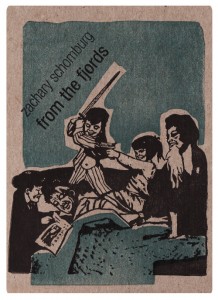 I got From the Fjords with a dent in the cover and was disappointed. I thought it was spoiled and put it aside next to a sink I never use in the basement. I forgot about it. When I came back to the book—the colors washed out, the dents—it was like some nice, cheap kids book had surfaced from my packing boxes. Something to revisit.
I got From the Fjords with a dent in the cover and was disappointed. I thought it was spoiled and put it aside next to a sink I never use in the basement. I forgot about it. When I came back to the book—the colors washed out, the dents—it was like some nice, cheap kids book had surfaced from my packing boxes. Something to revisit.
Or: -uck, -uck, uck, -uck, uck
Pink book spine, pink inner cover pages—pink bracelet of the book takes on strange meanings with Gordon Massman. Core Sample (Chap #2), mechanistic in approach, densely stressed and listing, is intent on violation on multiple levels:
…writhing in blood-paradise, naked, smeared, my mother’s
trick valve like an agitating washer throwing out blood, my asinine father
drunk on megalomania and sick-o dreams, hardly a knuckle on scabrous
hands, cows, semen, panting, kiss, fingerpainted hips, industrial concrete
abattoir, death bunker, orgy of meat, fuck on gore, fuck on clot, fuck on
gut, cheap clean apricot.
*
An absurdity to children’s books in the covers being so thick and palpable, almost double what’s in them. He comes with a big stick and beats the dummy until the terrified dummy flees upstairs. Or the value of what is inside as worth protecting though the covers themselves have revealed their long, inevitable half-life in beginning to decay. And the Spork chapbooks too, particularly given the opaque white 3/4s of a vellum cover that wraps the first 4. Or just the opposite—that the book will be dropped, thrown, yanked, chewed.
*
17/25 poems have death in them, impending or realized death of the narrator or another figure, the dead coming to visit, an allegory for death—Death. Death is often a travesty here—appearing for obscure or clearly absurd reasons. Given this one could argue that these poems like those of Zachary Schomburg’s prose-poem-weird-uncle Russell Edson—suffer from predictability. But this predictability is closer to fidelity. And fidelity is the point.
*
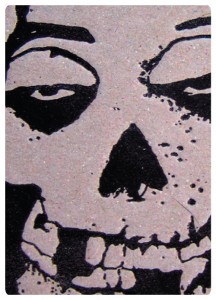 Marilyn M., M. Jagger, Warhol. Drew Krewer’s Ars Warholica (Chap #3) as a rabbit hole to disappear into as it reflects on, seeks likeness, copies, commodities, reflections—
Marilyn M., M. Jagger, Warhol. Drew Krewer’s Ars Warholica (Chap #3) as a rabbit hole to disappear into as it reflects on, seeks likeness, copies, commodities, reflections—
I never got the hi-tops
…
Together, we’ll parade our junk jewels
and dive into punctuation
…
Beautiful dreamers make beautiful flames
…
Yessir. We also share first names.
Oh—Andy—there’s a reason the books are all built the same. As if something decays in the exchange between being and perceiving this being in a polished surface.
Perceptions father habitable zones
.
Stop living under the bed, James.
Your father’s corpse is gone.
.
No nightlight, please. I enjoy the dark vinyl.
.
Let’s twist again—
bring your trigger solvent.
.
Never make me leave the bed
and I’ll cough you diamonds forever.
*
The method of sequencing in the chapbook series is sharp tonal and formal juxtaposition. As if each is shouldering past the other in a friendly serious way. It is crunchy and intentional. as sweet as one of the lollipop ballerinas in neon buggery /
flailing until the night light turns dawn / fatly salivating. Krewer’s book is the party Jake Levine’s book is recovering from. Levine’s poems witness with sympathy people trying to burn themselves down. They are poems for friends of those on-fire-friends—where childhood leads to “out back the monster on mescaline swallows a car.” And the party, the show being put together in aftermath, through the hangover in livid bursts that rarely exceed 12 lines and aren’t afraid to crawl through the hangover to assert plainly: “we lie / eat / don’t want to die / on the sharp edge of words // we manage / survive.”
The corners of the books that that aren’t fuzzed digging into my palms the whole time. Eventually finding all this repetition, lack of give, distressing. I want to take 99% off / and dive into a pool of Sprite. A horror-fascination.
*
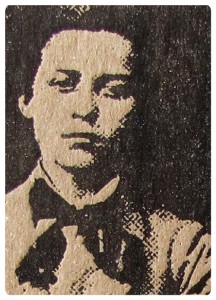 By book five I am back on my back. I hold the book over my face with my hands. To hold my hands up muscles in my shoulders hold my arms up. As muscles pull in my shoulders muscles in my neck pull. The neck muscles are sick of it. They are sick of holding up other muscles and holding together the cracked bones in my neck. They say “Fuck This” and bunch up tighter into themselves, pull nerve and bone tighter, bundle them up. This pressure causes pain. My neck has malfunctioned.
By book five I am back on my back. I hold the book over my face with my hands. To hold my hands up muscles in my shoulders hold my arms up. As muscles pull in my shoulders muscles in my neck pull. The neck muscles are sick of it. They are sick of holding up other muscles and holding together the cracked bones in my neck. They say “Fuck This” and bunch up tighter into themselves, pull nerve and bone tighter, bundle them up. This pressure causes pain. My neck has malfunctioned.
My muscles want these books to be lighter, nothing, insubstantial. The weight of these books is irritating. Most chapbooks are less substantial; they’re barely there. I have to hold this book. Hold it. It lifts off the ground clumsily, wet with sugary glaze, and I shoot again. This is mostly my fault.
*
I should mention this isn’t a “review.” Awhile ago I thought of compiling a hipster symbology. It would start with pirates, captains, and bears and what they mean to people between the ages of 17 and 36. I never got around to it. Partly because the term “hipster” is problematic. Reviewing is problematic. No one likes criticism.
Thank you, dummy, but I’ll take all the money.
The sun to rising, rising twice—there is pleasure in following the thread Beachy-Quick’s lines follow, the doubling, folding in of sound, sense. And more so than with the other books, his point is in his effervescent form and less than in what is said or as saturating what is said. A form that greens—in repetition, that regenerates, renews simple language and archetypical symbols. Expelling pretty orange clots of undigested verbs.
pansies grow pensive—
they point at the sun
by opening
their faces—
they open their faces
to point at
the sun—
where did I bury it?—
the seed, I mean, the
sea?—
The sun rises twice—
less gentle in the other
field, overtakeless
in mine. The pansies sing
their nursery rhyme:
*
These books in a row pummel but also know when to hold back. I’m compelled. I like this urgency. For some there are poems that will come across as toeing too dangerously the boundary between embodying myopic adolescence and turning all the ebullience into a lever. And sometimes it smells like semen. And sometimes it smells maybe too much like semen. But the series in the uniformity of design, the strange and definite kinships between authors, reflects a frightening singularity of purpose. There are over 100 more chapbooks projected by Spork of what already feels like an argument being elaborated, which makes this is an event happening now and going forward.
So don’t kill yourself.
*
…but I never come to the wooden bridge shaped like a shoehorn. In fact, I am back where I started, but where I started is my childhood living room, a golden milk-sour carpet, my parents young on the couch.
Tags: spork

read reply
bird skull or eary rabbit head
–
gun metal dray to the glue factotumry
–
kill yourself by living as much for as long as you can
Hi Joe Hall,
Good strong review of Sporkers and thank you for this exposure. I might add that The New York Quarterly Press will soon publish my complete numbers series, coming to 400 pages (of which Spork is just a “core sample”), and I would be glad to send you a copy when published should you be interested in reviewing it. I’m at: gmassman51@hotmail.com
Gordon Massman
Thanks Joe Hall. I liked your reading at AWP last year. -AndrewSpork (Spork’s designer).
Woh, I didn’t know we were saving our hypothetical readership from suicide, but this is the best compliment I’ve ever received for the work. “you are not alone, the poem said, in the dark tunnel” Much love.
Woh, I didn’t know we were saving our hypothetical readership from suicide, but this is the best compliment I’ve ever received for the work. “you are not alone, the poem said, in the dark tunnel” Much love.
[…] Joe Hall on the chapbook series, which you can read in its entirety on HTMLGIANT: […]
Hey Andrew–it was my pleasure (aside from almost lost my mind writing this). Just keep doing what yr doing.
[…] Posted on 21.01.2011 by joescirehall| Leave a comment Honest reviews are hard to write. Writing this one was like crawling through a series of increasingly smaller eyes in increasingly smaller needles. […]